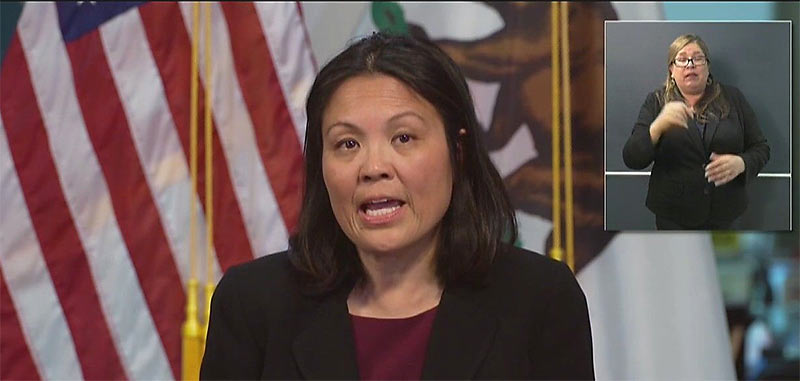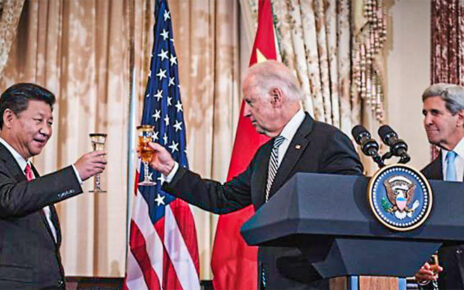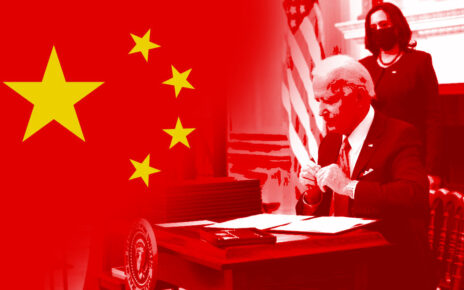Name: Julie Su
Position for Which Nominated: Deputy Secretary of Labor
Connections to China and/or Extreme Leftist Organizations:
Here’s a key question not yet asked at Julie Su’s Senate confirmation hearing. Given her previous efforts in defending immigrant victims of forced labor, how would she address Xinjiang? Will she stand up to Communist China?
Su was championed for an appointment in the Biden administration by the Asian Pacific American Labor Alliance (APALA). APALA Founding President, California Federation of Labor Vice President,and Director of the UCLA Labor Center, Kent Wong, said: “I can think of no one better to serve as the U.S. Secretary of Labor than Julie Su.” [i] Su was subsequently nominated for the number two position at Labor instead of the top spot.
The APALA is a Beijing-aligned labor group. “The formation of the Asian Pacific American Labor Alliance (APALA) in 1992 was a milestone in providing a voice for Asian Americans within the labor movement. … The establishment of APALA has its roots in the Asian American Movement of the 1960s and 1970s,” according to APALA founder Kent Wong, writing in “Legacy to Liberation: Politics & Culture of Revolutionary Asian Pacific America” by Carol Antonio.
“Revolutionary movements of the 1960s and 1970s, domestically and internationally nurtured the Asian American Movement. … Asian American activists were involved in the civil rights movement and the movement against the Vietnam War. … Asian Americans led and joined Marxist study groups around the country. Asian American activists gained inspiration from the Vietnamese struggle for liberation, and from the Chinese revolution and the teachings of Mao Zedong.
“Asian American activists played prominent roles in a number of emerging Marxist-Leninist organizations in the 1970s. … Many Asian American activists left college to work as grass roots organizers in the Asian American community, or to seek jobs in factories, to build a workers movement.
“In the 1980s, Asian activists began to set up Asian labor committees in key cities around the country. … From 1991 to 1992, there were a series of national meetings of Asian American trade unionists. … The founding convention of the Asian Pacific American Labor Alliance in 1992, surpassed everyone’s expectations.”
APALA was Marxist-led and pro-CCP from the beginning. It remains so today. Prior to forming APALA Wong was actually one of the leaders of the Communist Workers Party (CWP) an explicitly pro-CCP organization within the United States.[ii]
Wong edited a book on Asian American workers in the garment industry in 2006. One of the contributors to that book was Julie Su. [iii]In 2016 Su was given the Working Class Hero Award by the UCLA Labor center, run by Wong. [iv]
The co-founders of the APALA include Jean Quan, also of the Communist Workers Party and Victor Uno of the Line of March and the Union of Democratic Filipinos. Both the latter groups were expressly Maoist organizations that supported the New People’s Army of the Philippines. The APALA’s current first vice president Kim Geron was previously a leader of the Unity Organizing Committee, created in 1991 from the remnants of the pro-China League of Revolutionary Struggle. Several board members of the APALA are also former members of other Communist organizations including the League of Revolutionary Struggle, the Unity Organizing Committee, and the ultra-Maoist Red Guard Party.
APALA leaders have made repeated and frequent trips to Communist China. [v]
Su’s currently heads the California Labor and Workforce Development Agency (LWDA). She was appointed in 2019. Her tenure has been a disaster.
In the history of California, a state government agency has never been as mired in fraud and mismanagement as the LWDA is today. Under Su’s guidance, the agency has all but collapsed. Unemployment fraud is over $11 billion, with some reports suggesting the real figure could be closer to $30 billion. In February, a Los Angeles Times report confirmed that 144 California death row inmates had received unemployment assistance.
At Su’s confirmation hearing last week, North Carolina Senator Burr (R) said, “I’m sure there’s a reasonable debate to be had about the death penalty, but I can’t imagine one that involves paying people on death row for being unemployed.”
The notion that the top is a reflection of the bottom has never been this evident as California’s Employment Development Department (EDD) has undergone three leadership changes in 18 months. Due to an antiquated online system, customer complaints, and a near-absence a staff support network, the EDD has seen 1,500 employees resign under Su’s leadership.
The LWDA oversees the EDD, which is operated by a director, chief deputy director, and eight deputy directors, also known as the Executive Leadership Team (ELT). The agency serves as both the oversight body and executive management for their operations and administrative activities. The ELT is also responsible for establishing and maintaining a functional environment.
The beginning of the end began before the first COVID-19 case had been reported in the US. In December 2019, EDD chief Patrick W. Henning Jr. tendered his resignation. The following month, it was announced that Henning had joined California Life Sciences Association (CLSA) as its senior vice president.
As COVID-19 swept across California, forcing businesses to close and lay off millions of employees, Governor Newsom appointed Sharon Hilliard as the new EDD boss. Hilliard arrived amid the worst unemployment crisis since the Great Depression. By end of the year, Hilliard announced her retirement after 37 years of service with the EDD. Newsom appointed Rita Seanz (71) as Hilliard’s replacement, who chairs the state agency as of this writing.
According to recent national labor statistics, California’s unemployment rate is at nine percent, the second highest in the country, and has one of the worst increases in unemployment over the last year due to COVID-19.
Under Su’s leadership, the EDD has seen 1,400 employees resign, representing a ten percent decrease in its total workforce.
As California’s unemployment fraud reached record-breaking levels, Su ordered the EDD to eliminate safeguards so the agency could issue payments faster, but this created more opportunities for identity thieves to exploit a system that was already broken. Not long after she moved into her new role, a state auditor recommended that the department remove sensitive information requirements that mandated claimants provide their social security numbers for identification and verification purposes, but the suggestion, along with many others, went unnoticed.
Many Californians waited upwards of six months before receiving their first unemployment check. It was only after a state audit was ordered that it was revealed how EDD centers were answering just 1 percent of all incoming phone calls.
During former Governor Jerry Brown’s tenure, the state had received hundreds of millions of dollars in federal funding intended for administrative purposes to help the state improve its unemployment administrative system. For reasons that have yet to be revealed, very few changes or repairs, if any, were made. Meanwhile, California continues to place the blame on the previous White House administration rather than take responsibility for their shortcomings. [vi]
California’s EDD system uses COBOL, and the irony here is how the state is home to Silicon Valley, so one would think that an advanced program could be created that would serve as a national example. Not only is the system outdated, but by most accounts, it’s broken.
Senator Susan Collins (ME) noted how California’s fraud problem was the result of directives issued by Su. Collins offered examples that included $21,000 that was paid to Senator Diane Fienstein, and how inmates had received a combined total of $800 million in unemployment claims.
In what could be the most extreme example nationwide, some 1,700 claims had been made from the same address, and all of them were paid.
According to Collins, Su sent a memorandum to EDD director Susan Halliard, ordering the department to temporarily suspend unemployment eligibility certifications which lead to checks being issued without determining eligibility beforehand. Collins didn’t understand why Su would make such a unilateral decision when the requirement was never waived by the Department of Labor.
Su felt the majority of fraudulent claims in prisons were the result of the new federal Pandemic Unemployment Assistance (PUA), a move that placed the blame on D.C.
Su ordered an external “strike team” to analyze the rampant fraud. Supposedly, the report was made public, but it seems to almost impossible to find, not to mention that it didn’t fix anything.
Su blamed outdated technology that was “already vulnerable” and stressed that importance of finding a “national approach to the national problem.”
An employee isn’t promoted for doing a poor job, and it’s this idea alone that makes it difficult to accept how anyone could think Julie Su deserved a promotion. Based on her job performance and non-sensical answers during her Senate confirmation hearing, the Stanford law graduate revealed that she isn’t fit to be a Capitol Hill intern, much less a White House cabinet member. [vii] [viii]
Citations:
- [i]
- https://keywiki.org/Julie_Su
- [ii]
- https://keywiki.org/Julie_Su
- [iii]
- https://books.labor.ucla.edu/sweatshopslaves
- [iv]
- https://peoplesworld.org/article/ucla-labor-center-graduates-50-new-activists-forworkers/
- [v]
- https://amac.us/pro-china-labor-group-helped-flip-2-senate-seats-in-nevada/
- [vi]
- https://www.latimes.com/archives/la-xpm-2013-may-22-la-fi-labor-commissioner-20130522-story.html
- [vii]
- https://www.latimes.com/opinion/story/2021-02-11/editorial-julie-su-and-californias-unemployment-insurance-meltdown
- [viii]
- https://www.aol.com/news/editorial-californias-unemployment-system-collapsed-110032506.html




